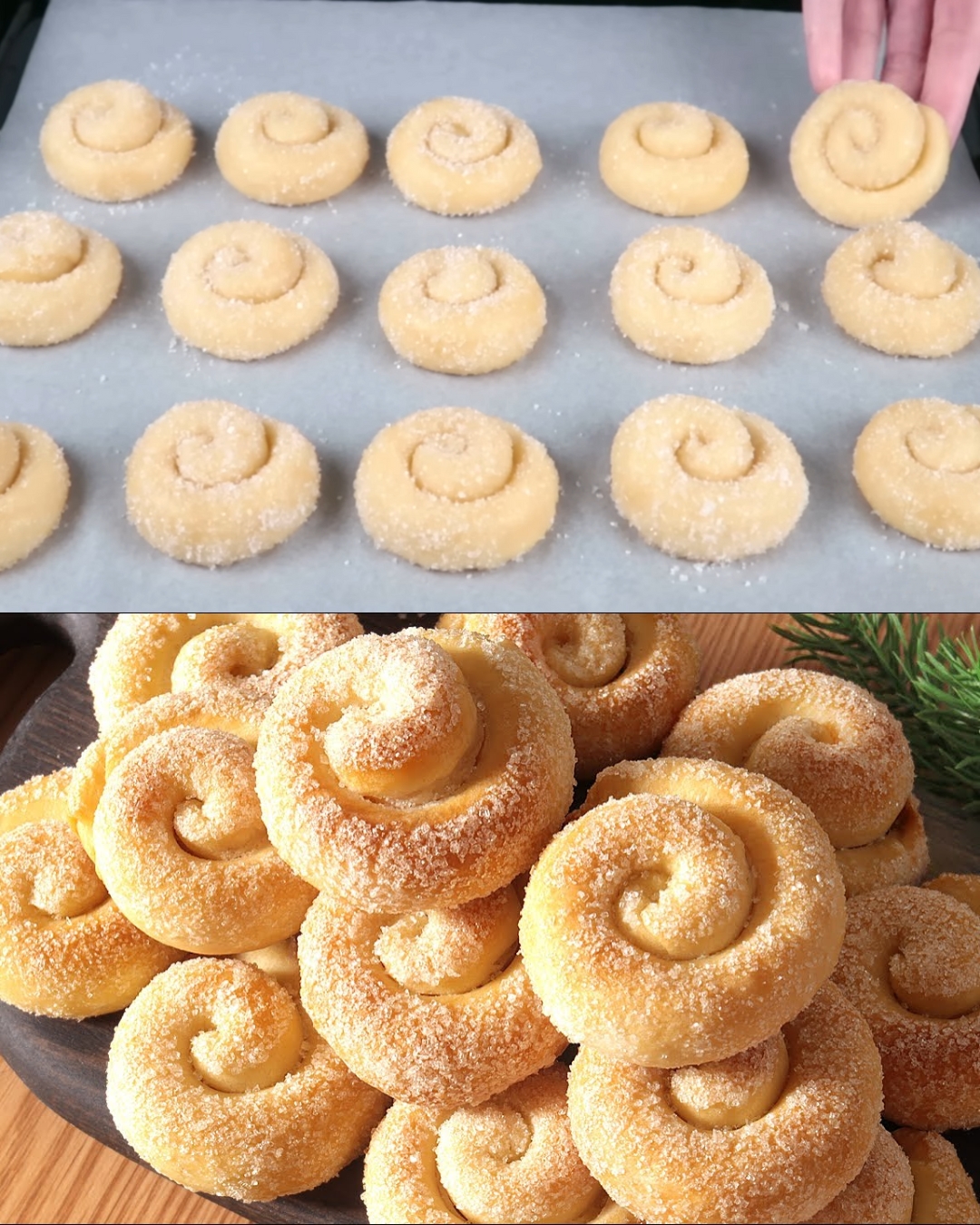These sugar-coated yogurt cookies are simple to make, with a soft and slightly chewy interior, combined with a crispy sugary crust. They are perfect for an afternoon snack or a sweet treat after a meal. The yogurt (or kefir) in the dough makes the cookies tender, while the sugar gives them a delightful crunch. Whether you’re making them for a special occasion or just as an everyday treat, these cookies will be a hit with everyone. The subtle hint of vanilla and the soft texture make them irresistible.
Advertisement
Preparation Time
- Preparation Time: 15 minutes
- Cooking Time: 20 minutes
- Total Time: 35 minutes
Ingredients
- 1 large egg
- 150 ml (½ cup + 2 tbsp) yogurt (or kefir)
- 2 tbsp sugar (plus extra for sprinkling)
- 70 ml (5 tbsp) vegetable oil
- 1 tsp vanilla extract
- Salt (to taste)
- 1 tsp baking powder
- 300–320 g (2½ cups) flour
Directions
1. Prepare the Dough
- In a large mixing bowl, whisk together the egg, yogurt (or kefir), sugar, vegetable oil, vanilla, and a pinch of salt until smooth and well combined.
- Add the baking powder to the mixture and stir until incorporated.
2. Add the Flour
- Gradually add the flour in 2–3 additions, mixing well after each addition.
- Knead the dough gently until it is soft, slightly sticky but still manageable.
3. Divide the Dough
- Divide the dough into 16 equal portions and roll each portion into a ball.
4. Roll and Shape
- Take each dough ball and roll it out into a thin layer using a rolling pin.
- Sprinkle sugar evenly over the surface of the dough.
- Roll the dough into a log and dip one side into sugar for an extra crunchy finish.
5. Bake the Cookies
- Preheat the oven to 180°C (350°F).
- Place the rolled cookies on a baking tray lined with parchment paper, leaving space between each cookie.
- Bake for approximately 20 minutes, or until the cookies are golden and slightly puffed.
6. Cool and Serve
- Let the cookies cool on a wire rack before serving.
Serving Suggestions
- Serve these cookies with a hot cup of tea or coffee for a delightful snack.
- They also pair wonderfully with a scoop of vanilla ice cream for a special treat.
- Pack them in lunchboxes or share them with friends for a light, homemade gift.
Cooking Tips
- Kneading: Be careful not to over-knead the dough, as it will make the cookies tough. A gentle knead will keep them soft.
- Flour Measurement: Start with 300g of flour and add more if needed to form a manageable dough. The dough should be slightly sticky but not wet.
- Sugar Coating: If you want a stronger crunch, you can dip the entire cookie into sugar before baking.
Variations to Try
- Citrus Zest: Add some lemon or orange zest to the dough for a fresh, citrusy twist.
- Chocolate Chip: Stir in some chocolate chips or chopped dark chocolate for extra richness.
- Spices: Experiment with spices such as cinnamon or nutmeg for a warm, aromatic flavor.
Nutritional Benefits
- Yogurt (or Kefir): Packed with probiotics, yogurt helps with digestion and supports a healthy gut.
- Vegetable Oil: The use of vegetable oil in these cookies offers a lighter texture compared to butter, providing a healthier fat option.
- Flour: A good source of carbohydrates, which provide energy for the day.
Conclusion
These sugar-coated yogurt cookies are a simple yet delicious treat that can easily be made at home. They offer a perfect balance of softness and crunch, with the added benefit of being easy to prepare and quick to bake. Whether you’re craving a snack, preparing for a gathering, or looking for a fun baking project, these cookies will satisfy your sweet tooth and bring joy to your day.
Frequently Asked Questions
-
Can I use a different type of flour? Yes, you can use whole wheat flour for a slightly denser cookie or gluten-free flour for a gluten-free version.
-
How long can I store these cookies? Store these cookies in an airtight container for up to a week at room temperature.
-
Can I freeze these cookies? Yes, you can freeze the dough or the baked cookies. Freeze the dough before baking for up to 3 months or the baked cookies for up to a month.
-
What can I substitute if I don’t have yogurt or kefir? You can substitute the yogurt or kefir with sour cream or buttermilk.
-
Can I add other toppings or flavorings? Yes, feel free to experiment with different toppings such as chopped nuts, dried fruit, or a drizzle of melted chocolate for an extra indulgence.

